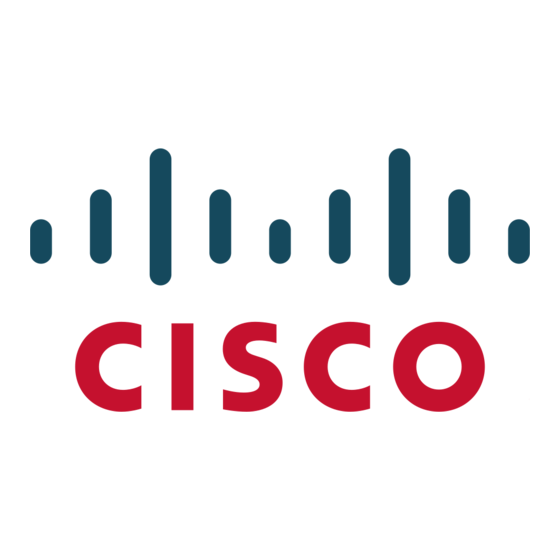Cisco CSS11501 - 100Mbps Ethernet Load Balancing Device Ficha de datos - Página 3
Navegue en línea o descargue pdf Ficha de datos para Hardware de red Cisco CSS11501 - 100Mbps Ethernet Load Balancing Device. Cisco CSS11501 - 100Mbps Ethernet Load Balancing Device 10 páginas. Css 11500 series
También para Cisco CSS11501 - 100Mbps Ethernet Load Balancing Device: Boletín de asistencia sobre productos (3 páginas), Ficha de datos (10 páginas)

The Cisco CSS 11500 also provides a complete solution for building
and provisioning Internet-scale global content distribution and
delivery. Whereas local load-balancing features determine the best
device within a data center, global load-balancing functions choose
the best data center in the Internet to service requests.
The Cisco CSS 11500 performs comprehensive resource verification
before routing user requests, ensuring that they are directed to the
location that has the best response time and the least load for the
requested content. Cisco supports global load balancing through
redirection based on both Domain Name System (DNS) and HTTP.
The DNS mechanism is fast and scalable; the HTTP method
provides the highest degree of control.
Site and System Security
The Cisco CSS 11500 with Cisco WebNS Software ensures high
levels of security without compromising site performance. The
Cisco CSS 11500 provides stateful, content-based access control,
and supports security policies based on any combination of source
address, destination address, protocol, TCP port, or URL.
Wire-speed Network Address Translation (NAT) protects real server
IP addresses.
For additional security, the Cisco CSS 11500 intelligently directs
traffic across multiple firewalls. By load balancing firewalls, the
Cisco CSS 11500 eliminates performance bottlenecks and single
points of failure that result in system downtime, a situation that can
close off the connection to the network and disrupt e-commerce
purchases or other mission-critical transactions.
Manage Through Simple GUIs or
Sophisticated Tools
Effective management tools reduce the ongoing cost of operating a
business-critical Web site. The Cisco CSS 11500 with WebNS
supports a wide range of management tools that offer simplicity,
security, and flexibility. For configuration, administrators have a
®
choice of a Cisco IOS
Software-like command-line interface (CLI)
or an intuitive, embedded graphical user interface (GUI). For large
networks, the Cisco CSS 11500 may be managed through enterprise
management systems such as CiscoWorks CiscoView and
tiered-access tools such as the Cisco Hosting Solutions Engine. For
integration with customized management systems or even user
applications requiring network interaction, the Cisco CSS 11500
offers an Extensible Markup Language (XML)-based,
programmatic management application programming interface
(API), Simple Network Management Protocol (SNMP), Remote
Monitoring (RMON), and log files. Effective management tools
reduce the ongoing cost of operating a business-critical Web site.
All contents are Copyright © 1992–2002 Cisco Systems, Inc. All rights reserved. Important Notices and Privacy Statement.
Cisco CSS 11500 Series Content Services Switch:
Chassis and Modules
The Cisco CSS 11500 Series Content Services Switch includes four
models:
• A one-rack unit, fixed-configuration Cisco CSS 11501 (6-Gbps
aggregate throughput)
• A one-rack unit, fixed-configuration Cisco CSS 11501 with SSL
termination (6-Gbps aggregate throughput)
• A two-rack unit, three-slot Cisco CSS 11503 (20-Gbps aggregate
throughput)
• A five-rack unit, six-slot Cisco CSS 11506 (40-Gbps aggregate
throughput)
The Cisco CSS 11501 and the Cisco CSS 11501 with SSL
termination supports eight 10/100 Ethernet ports and one Gigabit
Ethernet port though an optional small-form factor, pluggable
gigabit interface converter (SFP GBIC). Both Cisco CSS 11501
models feature a console port, an Ethernet port for management and
two PCMCIA slots that hold up to two 256-MB Flash memory
disks, up to two 512-MB hard disks, or one of each. The Cisco CSS
11501 with SSL termination delivers 1,000 SSL transactions per
second and 250 Mbps of bulk encryption (ARC4) by exploiting an
internal card with state-of-the-art cryptology chips.
The Cisco CSS 11503 and Cisco CSS 11506 are both modular
platforms with interchangeable modules. The Cisco CSS 11503 and
Cisco CSS 11506 may also share memory, disks and GBICs. The
Cisco CSS 11501 has fixed memory and does support the same disks
and SFP GBICs as the other two models.
The Cisco CSS 11506 requires at least one switch control module
(SCM) and may be configured with a second in standby mode. With
the required SCM in one slot, the Cisco CSS 11506 has five
additional slots supporting any combination of I/O, SSL, or session
accelerator modules. The Cisco CSS 11503 requires a SCM and
accommodates any two of the other optional modules.
The Cisco CSS 11506 supports not only redundancy in switch
control modules but also redundant power supplies and redundant
switch modules (20 Gbps each). All SCMs support redundant
disk drives.
All modules participate in flow setup, but they differ primarily in
control functions, performance, SSL capabilities, and I/O. Each
Cisco CSS 11500 Module consists of one high-speed MIPS RISC
processor for flow setup, one network processor for flow
forwarding, one classification engine for accelerated lookups in
bridge/access control list (ACL) tables, and up to 288 MB of
RDRAM.
Cisco Systems, Inc.
Page 3 of 10
